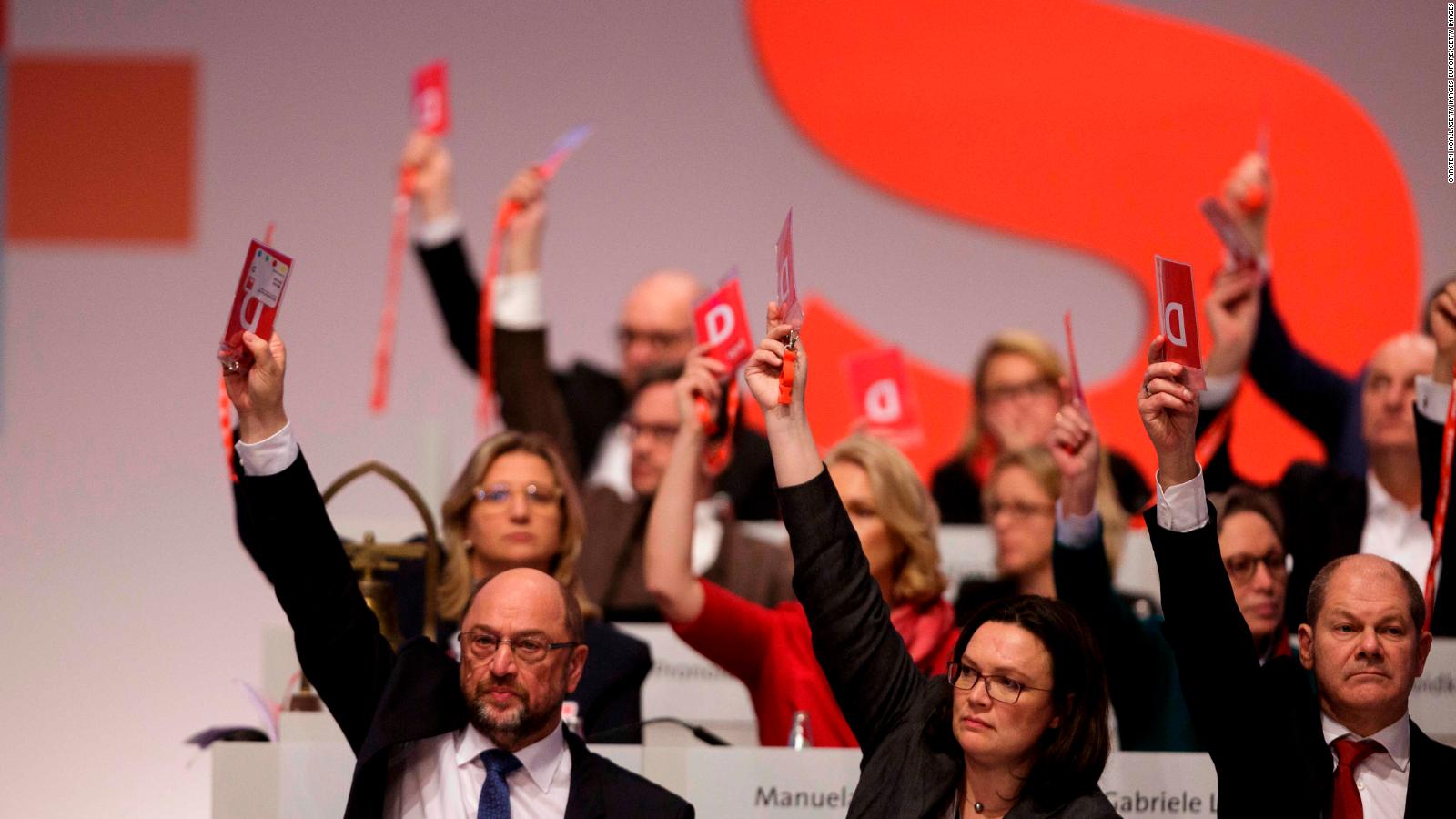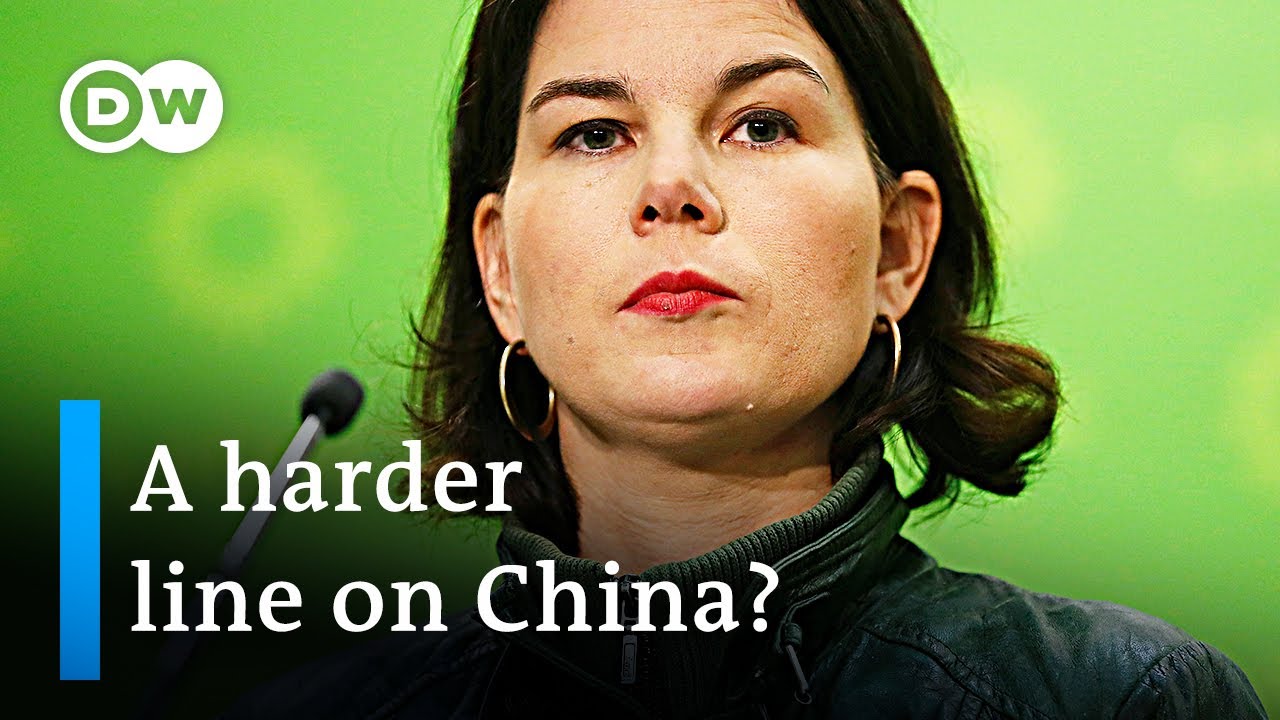
Members of Germany’s new coalition government.
Germany’s New Government Settles Nuclear Debate — for Now
Ronja Ganster / The German Marshall Fund
(November 29, 2021) — When Germany’s prospective government published its coalition treaty last week, its closest allies focused on one topic in particular: nuclear weapons.
Many feared that the country’s swing to the political left could result in an exit from NATO nuclear sharing. Since the early Cold War, Germany has been hosting US tactical nuclear weapons. As Europe’s largest NATO country, a shift in Germany’s nuclear policy is feared to reverberate throughout the alliance and greatly damage transatlantic security. The coalition treaty certainly elicited a collective sigh of relief from allies:
The new German government will continue to support nuclear sharing. At a first glance, the issue seems resolved. But a closer look at the new government’s position and the global nuclear landscape shows that the issue of nuclear policy, both in Germany and beyond, is far from settled.
The absence of foreign policy topics in Germany’s election debates created the impression of an overall foreign policy consensus among the country’s political parties. This could not be further from the truth when it comes to nuclear sharing. Chancellor Angela Merkel’s Christian Democratic Union (CDU) has always been a strong supporter of nuclear sharing and ensured continuity in Germany’s nuclear weapons policy over the past 16 years.
Following the CDU’s electoral defeat this September, the novel “traffic light” coalition between the Social Democrats (SPD), the Greens, and the Free Democrats (FDP), which will assume office the week of December 6, has a more complicated relationship with nuclear weapons.
In their respective election programs, the SPD and the Greens condemned nuclear weapons and declared a nuclear-weapons-free Germany as their policy goal. Both parties also envisioned Germany as an observer to the 2017 Treaty on the Prohibition of Nuclear Weapons (TPNW), with the ultimate goal of becoming a full member, which no other NATO country has done.

SPD floor leader Rolf Mützenich leads the SPD’s intra-party opposition to nuclear sharing. He is an outspoken critic of nuclear deterrence and, most recently, he called German defense minister Annegret Kramp-Karrenbauer’s reinforced commitment to deterring Russia “irresponsible.” The SPD’s more moderate wing still supports nuclear sharing, fearing a withdrawal could harm transatlantic relations.
The Green Party’s opposition to nuclear weapons has a long history, dating back to the party’s foundation in the wake of Germany’s peace movement. While the party’s pacifist “fundi” wing is known for its strong opposition to all things nuclear, even its more centrist voices supported an unsuccessful Bundestag motion for Germany to join the TPNW at the beginning of this year — which would have required an exit from nuclear sharing.
The SPD and the Greens both saw an influx of first-time candidates elected to the Bundestag, with more than 20% of their parliament members coming from the parties’ youth organizations. The Green Youth and Young Socialists are known for representing more progressive and left-leaning voices, moving the parties’ ideologies further to the left. This will also be felt in the debate on nuclear sharing.
The FDP, while subscribing to the long-term goal of a nuclear-weapons-free world, opposes any unilateral actions by Germany that contradict NATO strategy and could undermine the transatlantic alliance. As the smallest out of the three likely coalition partners and focusing on fiscal and economic issues rather than foreign and security policy, the FDP’s assertiveness on the nuclear question is uncertain.
While the issue was unsurprisingly a point of tension during the current coalition talks, the coalition treaty published last Wednesday reveals that the realists prevailed over the pacifists during the negotiation. In the document, the traffic light parties affirm they “are committed to maintaining a credible deterrent potential” [https://www.gmfus.org/news/germanys-new-government-settles-nuclear-debate-now – _ftn11] acknowledging the continuing threat to the security of Germany and Europe as well as the concerns of Central and Eastern European partners. The party leaders also revealed that the Ministry of Defense would be led by the SPD and the Foreign Office by the Greens’ Annalena Baerbock, with the names of the prospective defense minister to be released only on December 4.
The decision on nuclear sharing had been expected: In the wake of the economic recovery from the coronavirus pandemic, the fight against climate change, and the backlog of infrastructure investments, it was unlikely that either party was willing to invest the political capital needed to alter Germany’s fundamental foreign policy strategy.
But the ministry distribution is a clear signal for the foreign policy direction of the new government: the FDP, the only party clearly in favor of nuclear sharing, does not want to play a prominent role in the country’s foreign and security policy, with the chancellery, foreign ministry, and defense ministry all led by left-leaning parties. A written commitment to nuclear sharing in the coalition treaty will therefore not be the end of the debate.

The Tornado Option
There is another way opponents of nuclear sharing could quietly get what they want. If US nuclear weapons stationed in Germany were to be used, German Tornado aircrafts would carry the weapons to their target. However, the current fleet is barely operable and in desperate need of replacement. A further delay of the matter effectively means that Germany would end up without a functioning carrier in a few years and equal a passive withdrawal from nuclear sharing.
In the coalition treaty, the traffic light parties commit to procuring a replacement at the beginning of the next legislative session and accompany the procurement and certification process with regard to nuclear sharing “objectively and conscientiously.”
That hardly sounds like an act of conviction and German news platform Der Spiegel previously compared the wording to a “self-disciplinary” statement. The coalition partners’ widely differing stances on the nuclear matter and the need for approval through the Bundestag’s budget committee will certainly complicate the process, with the clock in the background ticking louder and louder.
Lastly, the coalition treaty envisages Germany to “constructively accompany the intention of the [TPNW] treaty” as an observer at the next Conference of the Parties, which is scheduled for March. After Norway’s newly elected government made the same announcement last month, Germany will be the second NATO country and first nuclear sharing country to do so. As an observer, Germany is still a step away from membership, but it sends a clear sign to NATO and the United States, where fears have been spreading that such a decision could kick off a domino effect among its members and weaken alliance cohesion.
Germany’s soul-searching on nuclear weapons comes at a time of increasing global polarization on the topic. On the one hand, civil society organizations’ calls to ban nuclear weapons are intensifying and the Treaty on the Prohibition of Nuclear Weapons entered into force early this year with more than 50 signatories. On the other hand, the world’s nuclear weapon states are heading in a different direction.
Early last year, French President Macron invited EU countries to participate in a dialogue about the role of nuclear weapons in EU security and offered participation in French nuclear exercises. In its “Integrated Review,” published this March, the United Kingdom announced it would lift the cap on the number of nuclear warheads in its possession. Russia is planning to increase nuclear spending to modernize its nuclear arsenal and China is already engaging in a massive modernization and buildup of its nuclear arsenal, outpacing previous estimates of the speed and scope of its nuclear ambitions.
NATO is expected to publish its new strategic concept in June next year and there are no signs that the alliance will be reducing the role of nuclear deterrence in its strategy. At this year’s Brussels summit, NATO member states reiterated that “As long as nuclear weapons exist, NATO will remain a nuclear alliance.”
In the United States, the Biden administration is currently undertaking the Nuclear Posture Review with results expected early next year. Unlike his predecessor, President Biden is a strong proponent of arms control and has spoken in favor of a “sole purpose” strategy during his campaign.
While past US nuclear strategies were intentionally vague regarding the scenarios in which the United States would use nuclear weapons, a “sole purpose” strategy would restrict the purpose of US nuclear weapons to the deterrence of or retaliation against another nuclear attack. Such a policy is believed to decrease the risk of nuclear escalation because it effectively excludes preemptive nuclear strikes and resembles a “no first use policy.”
A change in US nuclear doctrine would have considerable implications for the US nuclear umbrella in Europe and plays right into the German debate about nuclear sharing. Limiting the purpose of US nuclear weapons stationed in Europe would decrease their deterrent effect and give those who are demanding a revision of NATO nuclear policy in Europe what they want. Just a few weeks ago, several US allies, including the United Kingdom, France, and the outgoing German government, pleaded for Biden not to adopt a “sole purpose” strategy.
Although the incoming traffic light government just decided on continuing Germany’s commitment to nuclear sharing on paper, the coalition agreement will not deter ideologically opposed members of the government coalition from continuing to lobby against it, as demonstrated by SPD floor leader Mützenich during the last government’s term. Significant forces within the SPD and the Greens would likely commend a shift in US nuclear policy and gladly use it as a starting point for revisiting Germany’s nuclear attitude — with Biden as an unlikely but welcome ally for their vision of a nuclear-weapons-free Germany.
Germany’s New Green Foreign Minister Baerbock
Threatens Russia and China with Nuclear Weapons

Johannes Stern / World Socialist Web Site
(December 7, 2021) —Just days before Annalena Baerbock is sworn in as Germany’s new foreign minister, the co-leader of the Green Party gave the taz newspaper a widely-read interview on foreign policy issues. Baerbock’s statements make two things clear: On the one hand, the “traffic light” coalition of the Social Democrats (SPD), Free Democrats (FDP) and the Greens, which will officially take over government business on Wednesday, will intensify the grand coalition’s war and rearmament policies, especially with regard to the nuclear powers Russia and China. Secondly, the former pacifists of the Greens, who launched the first German foreign military intervention since the end of the Nazi regime when the party was last in power between 1998 and 2005, are once again playing the central role.
With an aggressiveness that is otherwise seen only from extreme right-wing and militarist circles, Baerbock linked Germany’s ability to pursue an aggressive foreign and great power policy with nuclear rearmament. “It is precisely this question of nuclear weapons that makes it clear that in the future we will again pursue an active German foreign policy that faces the dilemmas of global politics,” she explained. “We stand by our responsibility within the framework of NATO and the EU and also for nuclear participation.”
As if this was not enough, she went a step further. In the midst of the pandemic, which has already cost more than 100,000 lives in Germany alone, and which the government allegedly lacks the economic resources to combat, she reaffirmed the traffic light coalition’s call for the procurement of new combat aircraft capable of deploying nuclear weapons. “We have to procure the successor system for the Tornado because the conventional capabilities have to be replaced. So it’s not just about so-called atomic bombs. We will then have to continue talking about the issue of nuclear certification,” she declared.

Neither Baerbock nor the taz spell out what these plans mean. In financial terms, they dwarf all rearmament projects since the end of World War II. Germany is planning to replace the outdated Tornado aircraft by procuring at least 90 new Eurofighters and 45 American F-18 fighter jets. Total cost: almost 20 billion euros. And that is only the beginning. Germany and France are currently developing the European Future Combat Air System, which will cost several hundred billion euros by 2040.
And what exactly does “nuclear participation” mean? In the event of a conflict, German warplanes armed with US atomic bombs stored in Germany would be mobilized, possibly even resulting in the bombs being dropped—with catastrophic consequences. A full-scale nuclear war between the NATO powers and Russia (and/or China) would not only turn all of Europe into a nuclear desert, it would mean the annihilation of the entire planet.
Baerbock made no secret of the fact that the rearmament is primarily directed against Moscow and Beijing. When the taz stated that “Russia has become more threatening,” Baerbock replied, “The legitimate security interests of the states in Central and Eastern Europe in particular must be taken seriously.” A “values-based foreign policy” is “always an interplay of dialogue and rigor. In the long run, eloquent silence is not a form of diplomacy, even if it has been seen that way by some in recent years,” she said.
In other words: the new federal government will intensify the aggressive course towards war against Russia. In fact, the foreign policy towards Moscow in recent years has not consisted of “eloquent silence,” but has followed a line that is directly linked to the imperialist great power policy of the German Empire and of Hitler. In 2014, Berlin supported the right-wing coup in Ukraine to install an anti-Russian regime in Kiev and weaken Moscow. Since 2017, the German army has been relocating combat troops to Eastern Europe as part of the so-called NATO Enhanced Forward Presence (eFP).
The Greens played a particularly aggressive role from the start. In the protests on the Maidan in Kiev, which were dominated by right-wing extremist forces, both the party-affiliated Heinrich Böll Foundation and many leading Green Party members were actively involved. In doing so, they openly defended and played down the alliance with fascist figures such as Svoboda leader Oleg Tyahnybok.

Now they are going one step further and calling for the Ukrainian army and the fascist militias allied with it to be armed against Russia. In the election campaign, co-leader and vice-chancellor-designate, Robert Habeck, travelled at the invitation of Ukrainian President Volodymyr Zelensky to address the front in eastern Ukraine, declaring that he considered “Ukraine’s wishes for arms deliveries in view of the war in the east of the country to be justified.”
It is now clear which strategy the NATO powers are pursuing. The US-led military alliance is pressing ahead with the offensive against Russia to distract attention from the impact of the criminal pandemic policy at home. NATO is holding massive military maneuvers on the Russian border and arming Ukraine with Javelin anti-tank missiles, guided-weapon-armed warships and anti-aircraft missiles. The Kiev government has not denied Russian reports that the Ukrainian military is gathering 125,000 soldiers on the border with Russia.
Baerbock also supports the US war course against China — which no less threatens to trigger nuclear war. “As European democracies and part of a transatlantic democratic alliance,” we are “also in a systemic competition with an authoritarian regime like China,” she raged in the taz. In this regard, it is important “to seek strategic solidarity with democratic partners, to defend our values and interests together and to persistently promote these values in our foreign policy.”
In fact, the issue at stake is not “values,” but tangible economic and geostrategic interests. China is a “competitor, especially when it comes to the question of future technological leadership,” Baerbock herself admits. In order to assert its own interests, Baerbock appealed for a more aggressive European policy on China under German leadership. She threatened to restrict China’s access to European markets and did not rule out a boycott of the upcoming Winter Olympic Games in Beijing.

Europeans should “not make themselves smaller than we are. We are one of the largest domestic markets in the world,” she boasted. China in particular has “massive interests in the European market.” If, for example, “there is no longer any access for products that come from regions like Xinjiang, where forced labor is common practice, this is a big problem for an exporting country like China,” claimed Baerbock. This “lever of the common internal market” works “only if all 27 member states pull together and not, as in the past, Germany as the largest member state formulates its own China policy.” We need “a common European policy on China,” she concluded.
The Greens specialize in using phrases about human rights, democracy and climate protection to mobilize wealthy layers of the petty bourgeoisie for an aggressive foreign and war policy. Baerbock personifies this clientele and the turn to the right of their party like no other. She became a member of the Greens in 2005, when the Schröder-Fischer government broke up due to resistance among workers and young people against the red-green coalition’s attacks on social welfare programmes and pro-war policies.
Sixteen years later, Baerbock is taking office as foreign minister in order to continue the hated war policy—even if it ends in a third world war. In order to prevent a catastrophe, the growing opposition needs a clear political perspective and orientation. The fight against militarism and war requires — just like the fight against social inequality, fascism and the “profits before lives” policy in the pandemic — the independent political intervention of the working class on the basis of a socialist program.
Posted in accordance with Title 17, Section 107, US Code, for noncommercial, educational purposes.